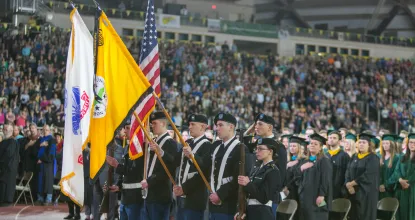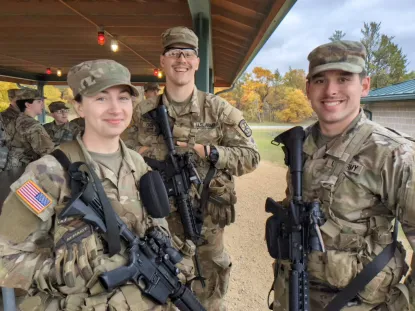
The Wildcat Battalion of Army ROTC
The Wildcat Battalion of Army ROTC is a growing, dynamic and yet closeknit program which allows for individualized instruction under which cadets excel both within the program and academically. The Wildcat Battalion receives outstanding support from the university. In fact, NMU is consistently named a “Military Friendly School by G.I. Jobs magazine.”— a designation that ranks NMU in the top 15 percent of colleges and universities nationwide.
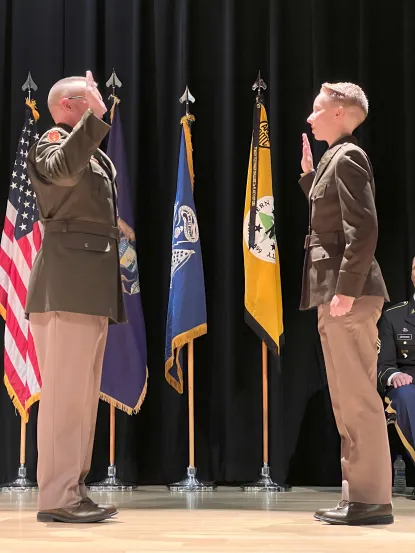
Earn a commission
Army ROTC is an elective curriculum (military science classes + additional training) you take along with your required college classes. It prepares you with the tools, training and experiences that will help you succeed in any competitive environment. Along with great leadership training, Army ROTC can pay for your college tuition. Those qualified students who join the commissioning program will have a normal college experience like everyone else on campus, but when they graduate, they will be officers in the U.S. Army.
Being an officer in the U.S. Army means you are a leader, counselor, strategist and motivator. It is similar to being a vital manager in a corporation. As an officer, you will lead other Soldiers in all situations and adjust in environments that are always changing. Officers are problem-solvers, key influencers and planners. They are driven to achieve success with their team on every mission.
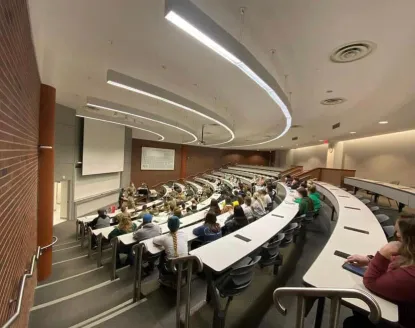
Facts at a glance
The majority of officers serving in today’s Army got their start through the Army ROTC program.
Since it was formally organized in 1916, more than a half-million men and women have become Army officers through the Army ROTC program.
Prominent graduates of the Army ROTC program include:
- Colin Powell – Former U.S. Secretary of State and former Chairman of the Joint Chiefs of Staff
- Samuel Alito – Supreme Court Justice
- Sam Walton – Founder of Wal-Mart
- Lenny Wilkens – Basketball great and coach
- Earl Graves – Chairman and Publisher of Black Enterprise Magazine
- Nancy Sherlock Currie – Space Shuttle astronaut
- Lou Holtz – Legendary football coach
- Peter Schoomaker – Recently retired Chief of Staff of the Army
- James Earl Jones – Famed Actor
- Robert Novak – Syndicated newspaper columnist and CNN panelist
- George W. Casey, Jr. – Chief of Staff of the Army
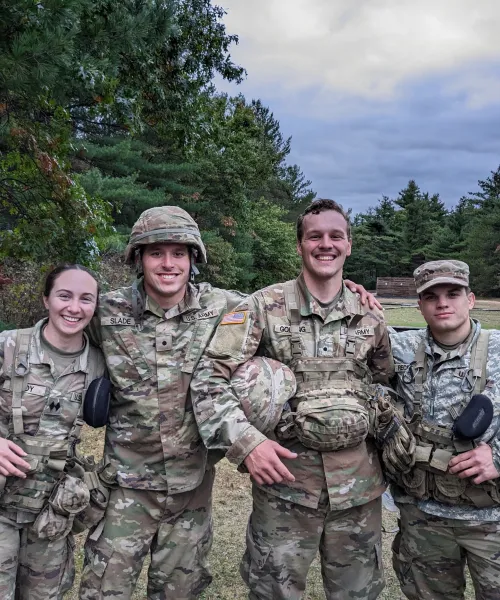
Training, Labs and Competitions
The Field Training Exercise (FTX), is a culminating training event for the Wildcat Battalion. Each year, we hold one FTX in the fall and another in the winter semester. They take place over a three-day weekend at Fort McCoy, WI. The FTX generally consists of day and night land navigation, weapons qualification, rappelling, obstacle courses, etc. In recent years, we have joined forces with cadets from Michigan Tech University in order to share tactical ideas, work with others outside of our unit, and create a more realistic training environment by having a greater number of soldiers participate. These are our greatest training events during the school year because cadets can apply the knowledge and skills they have acquired during their military science courses.
Training is the most important part of a cadet's life as a member of Northern Michigan University's Wildcat Battalion. Cadets at NMU have numerous opportunities to train on campus or with the Active Duty military, National Guard or Army Reserve. Throughout your experiences at NMU, you can challenge yourself with physical fitness training, military science coursework, extracurricular activities, military science clubs, and summer training/internships.
Basic Camp
This summer training camp is designed for students who missed all or part of the freshman and sophomore years of ROTC on campus. This course is designed to award credit for the Basic Course (first two years of ROTC) allowing students to "catch up." Students who complete Basic Camp are then eligible to complete the last two years of ROTC (Advanced Course) and commission as Army Officers upon graduation. Students who participate in ROTC, but do not have credit for the Basic Course may be awarded a scholarship before Basic Camp, and scholarships are often awarded to attendees based upon their performance at Basic Camp. Students are also paid for this training and all basic necessities, transportation, and equipment are provided.
Advanced Camp
All contracted cadets must complete the four-week Advanced Camp at Fort Knox, KY. This is normally done during the summer between a cadet's junior and senior year and it is required prior to appointment as a commissioned officer. This training supplements campus instruction by providing practical leadership experience in the form of problem analysis, decision-making, and small group leadership experiences. This course is an intense experience that matures and shapes each individual. Cadets are paid for this training and all basic necessities, transportation, and equipment are provided.
Physical Fitness Training (otherwise known as PT) is a necessary component of every soldier's life. Students join ROTC with varying levels of physical fitness. Many have already integrated fitness, rest, and proper nutrition into their busy lives, but some may just be getting started when they join the program. It is our mission to help each individual reach their fullest potential. We provide you with the resources and guidance needed to succeed, no matter what your beginning level of fitness.
Physical Fitness Requirements
- General Info: Physical Fitness Training takes place every Monday, Wednesday and Friday from 6:30 to 7:30 am inside or outside of the Superior Dome (depending on the weather conditions). PT is conducted by cadets in their second or third year with the program. The Army has installed a new approach for conducting physical training called Physical Readiness Training (PRT). NMU's Wildcat Battalion currently utilizes PRT during PT sessions to reduce injury and incorporate gradual physical fitness progression.
- ACFT: Each student will be required to complete an Army Combat Fitness Test (ACFT) every semester. The ACFT consists of six events, each with a maximum score of 100 points, for a total maximum score of 600 points. The six events are: 3-rep deadlift, standing power throw, hand release push-ups, sprint-drag-carry, plank, and a 2 mile run.
- To view the current ACFT standards, click here.
- Height & Weight Standards: Cadets must maintain certain height and weight standards to be able to contract into the Army, be considered for a scholarship, and commission as an officer after graduation.
- MS-269: At some point in each student’s ROTC career, they will need to sign up for the actual Army Physical Fitness Training class, MS-269. It is the same thing as regular PT, but cadets will receive one credit for participating through the university.
- Uniform: Contracted cadets are required to wear their issued Army Physical Fitness Uniform during all PT sessions. The Army Physical Fitness Uniform consists of their issued T-shirt, shorts, and safety belt; sweat pants, reflective jacket, and soft cap during the winter months; and above-the-ankle white socks, tennis shoes, and a water bottle. There is no uniform requirement for students who are simply taking the MS-269 course through NMU.
Labs
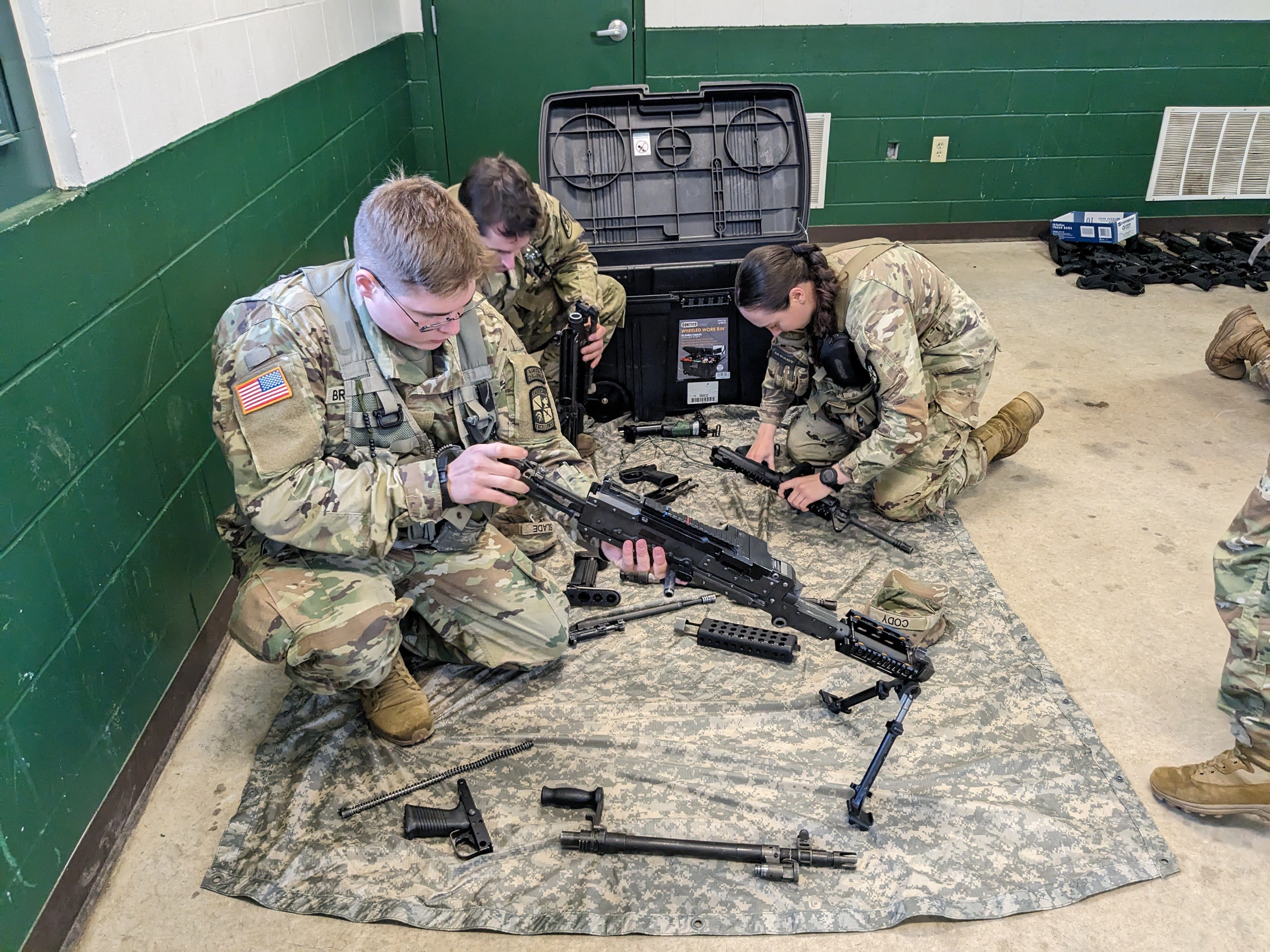
Labs are the weekly training events that drive the ROTC program. On Thursday afternoons, all the cadets come together and work as a team to hone their soldier skills and build camaraderie. These labs are planned and executed by the upperclassmen of ROTC and provide all involved with a great experience. Cadets get the chance to learn how to handle weapons, conduct land navigation, communicate by radio, and other soldier skills. Cadets also learn how to conduct attack, reconnaissance, ambush, and raid missions using tactics as a mechanism to practice leadership. These labs teach cadets how to react properly under pressure and grow as leaders by providing them with opportunities to lead.
Rappelling
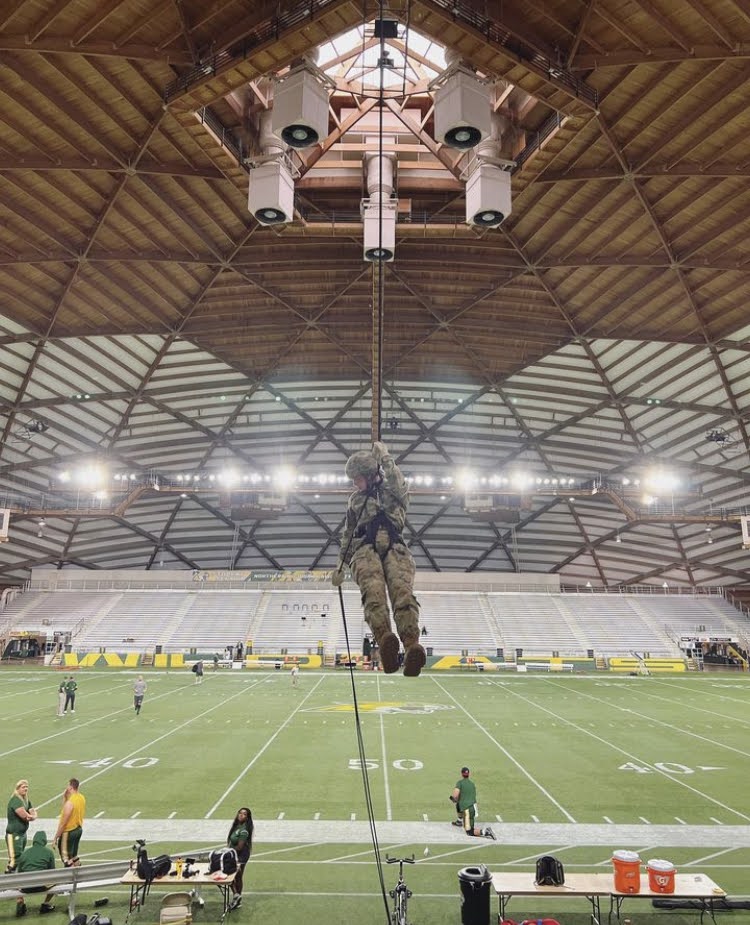
Cadets also partake in a rappelling lab each semester. Here they learn the proper techniques to rappel on a double rope, belay other rappelers, and tie several rappelling knots. This culminates in a free rappel from the catwalks at the top of the Superior Dome, ranging from 90-120 feet! Cadets who successfully complete a rappel from the top of the dome are inducted into the Order of the Yooper Dome, and can assist with rappelling the game ball in for home football games.
Combat Water Survival Training

Each year, students complete the standard Army Combat Water Survival Test (CWST) in order to gain water confidence. CWST includes swimming 50 meters with a dummy M16 rifle, an underwater gear drop, and a 30 foot jump off the high dive platform (all of which is performed while in uniform). Additionally, cadets learn water survival techniques - specifically, how to create floatation devices with their trousers. This is another great day for the Wildcat Battalion!
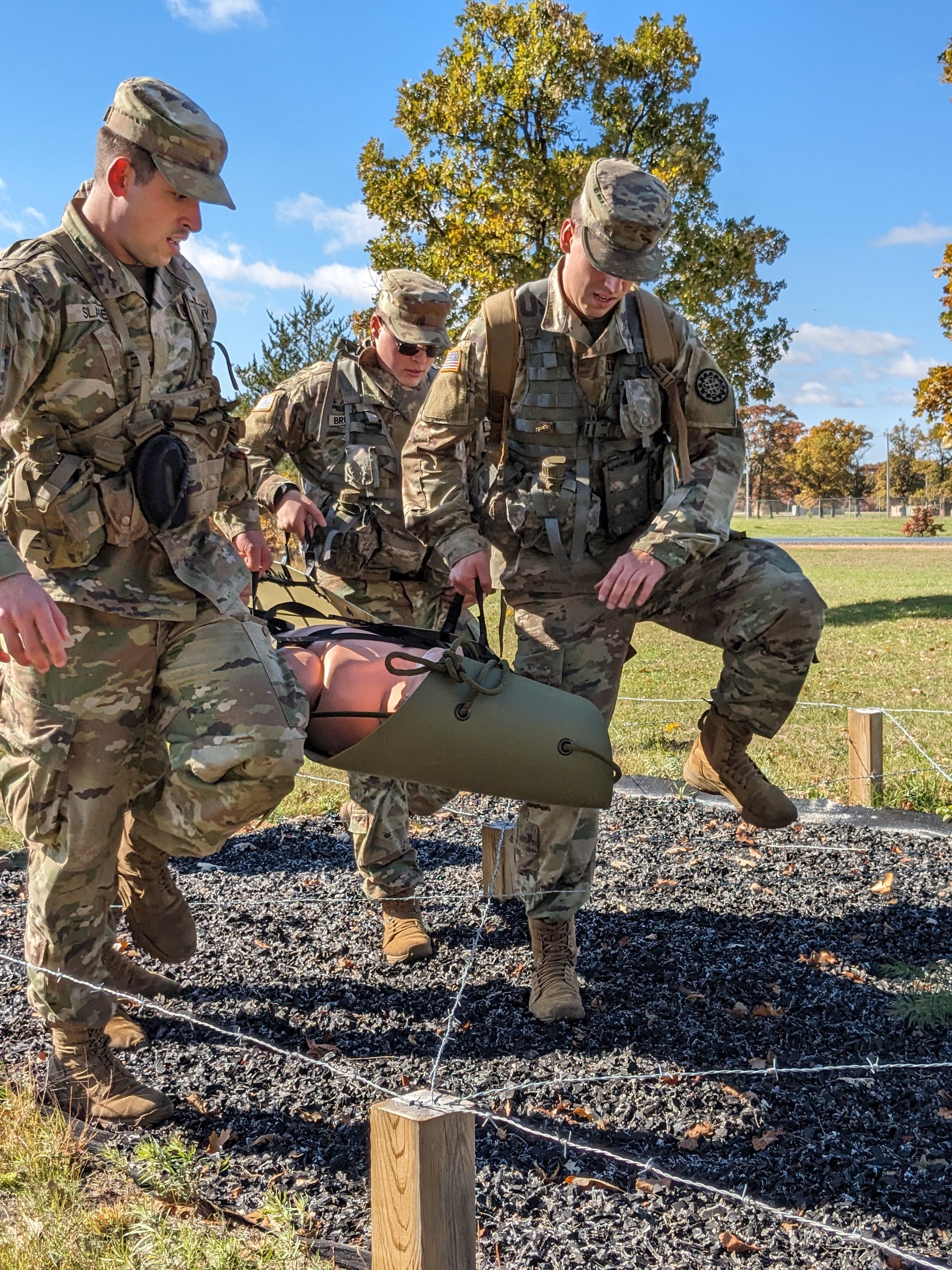
In addition to what is listed above, the NMU Wildcat Battalion conducts mission-specific labs where cadets are cycled through a series of leadership positions. This involves detailed planning, clear communication, and actual execution of different missions. ROTC uses infantry tactics as a measure of leadership and critical thinking. During these labs, cadets learn how to issue operations orders and learn the techniques to be successful during an attack, recon, ambush, or raid. The main purpose for these labs is to develop each cadet into a leader - someone who is confident, competent, and able to use adaptive thinking during difficult situations.
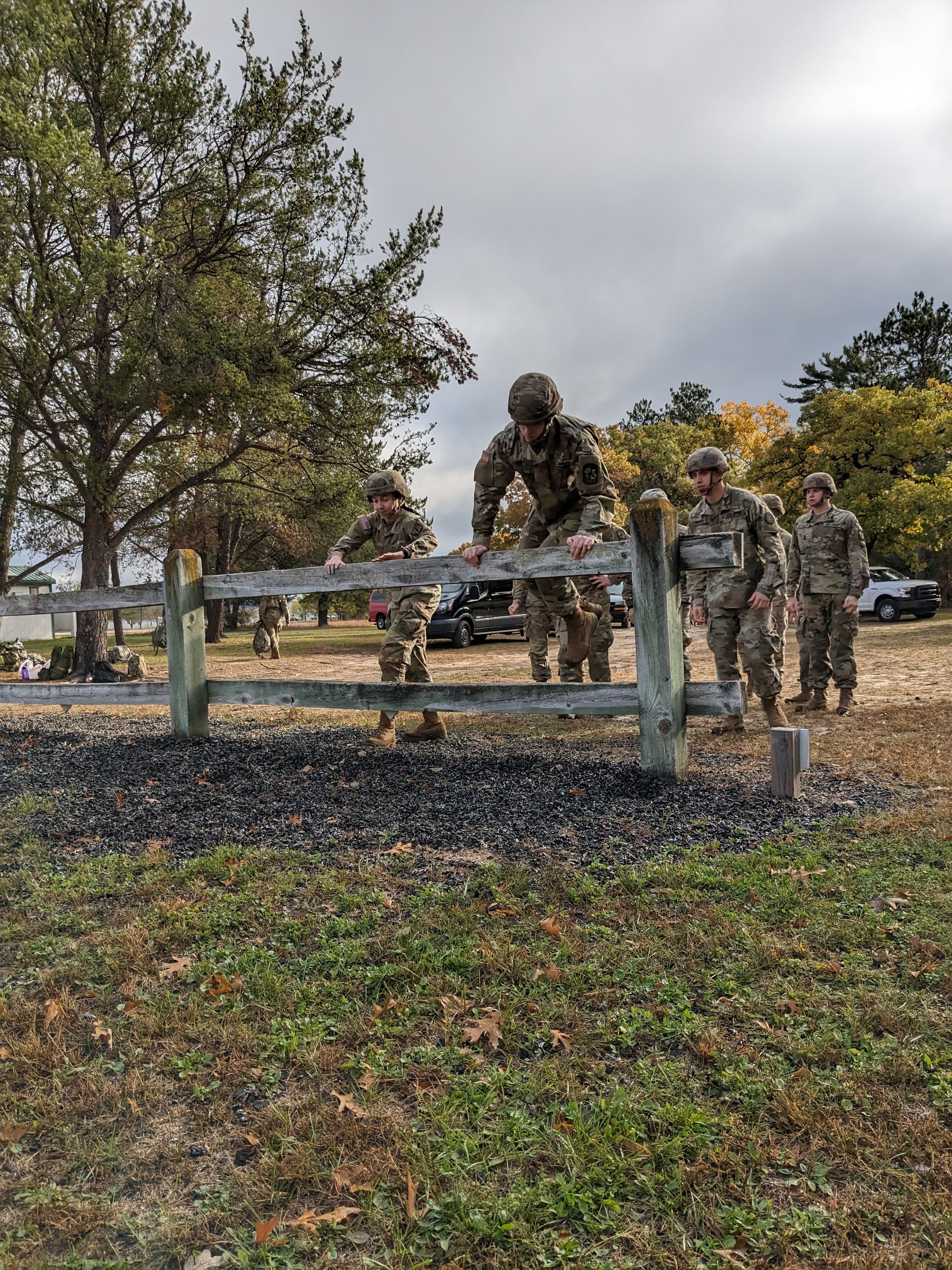
Ranger Challenge is considered the "varsity sport" of Army ROTC. Focusing on basic infantry skills, squad-sized teams compete against other schools within the region in what is called the Ranger Challenge Task Force Competition. The competition takes place in the fall, and all cadets in good academic standing are invited to participate. Ranger Challenge cadets conduct Physical Training (PT) six times a week, separate from the rest of the battalion, in order to prepare for the challenging competition. The competition itself is usually held on the second weekend in October, but cadets begin their training as a team as soon as school starts. (Many start individually training much earlier). Teams that take first place at the Task Force Competition are invited to compete in the Brigade Competition which is a larger, more difficult event.
Specific events at the annual Ranger Challenge Competition include:
- Constructing and crossing a one-rope-bridge
- Weapons challenge
- Physical challenge
- Day and night land navigation
- First aid & litter carry challenge
- Timed road march
Frequently Asked Questions
Training and Curriculum
The specific training you receive in Army ROTC will teach you things like leadership development, military skills and adventure training. This will take place both in the classroom and in the field, but you will have a normal daily schedule like all college students. Army ROTC is comprised of two phases: Basic Course and Advanced Course. Contracted cadets must complete both phases, the Cadet Leadership Course (CLC), a military history course and the Enhanced Skills Training Program in order to satisfy officer commissioning requirements.
Army ROTC Basic Course
The Basic Course takes place during your first two years in college as elective courses. It involves one elective class (MS 139, MS 159, MS 239, MS 259) and associated lab each semester. You will learn basic military skills, the fundamentals of leadership, and start the groundwork toward becoming an Army leader. You can take Army ROTC basic course classes and participate in associated labs and field training without a military commitment.
Veterans of the armed forces, students who are enlisted in the Army National Guard or U.S. Army Reserve and those who completed JROTC in High School may receive advanced placement credit for the Army ROTC Basic Course with permission from the professor of Military Science. For those college students who will have attained junior or senior status by the end of the winter semester, there is a summer training program called Cadet Initial Entry Training (CIET), which qualifies you to enter the Army ROTC Advanced Course.
Cadet Initial Entry Training
The Cadet Initial Entry Training (CIET) course is an obligation-free, five week program held each summer at Fort Knox, KY. Here, cadets learn basic soldier skills and leadership techniques. Upon completion of the program, students are qualified for the Army ROTC Advanced Course and will be invited to contract into the commissioning program. Numerous scholarships are awarded based off of performance at CIET. Cadets are paid for this training; and all basic necessities, transportation and equipment are provided by the U.S. Army.
Army ROTC Advanced Course
The Advanced Course takes place during your last two years in college as elective courses. It includes one elective class (MS 339, MS 359, MS 439, MS 459) and associated lab each semester, plus a summer leadership camp called the Cadet Leadership Course (CLC). You will learn advanced military tactics and gain experience in team organization, planning and decision-making. Entering the Advanced Course as a contracted cadet requires a commitment to serve as an officer in the U.S. Army after you graduate.
At NMU, students that do not desire to be commissioned officers may take the Advanced Course classes towards a minor in military science but may not participate in labs, field training exercises or CLC.
Cadet Leadership Course
All contracted cadets must complete the four-week long Cadet Leadership Course (CLC) at Fort Knox, KY. This is normally done during the summer between a cadet's junior and senior year, and it is required prior to his or her appointment as a commissioned officer. This training supplements campus instruction by providing practical leadership experience in the form of problem analysis, decision-making and small group leadership experiences. This course is an intense experience that matures and forges each individual. Cadets are paid for this training; and transportation, food, shelter, clothing and other basic necessities are provided by the U.S. Army.
Those that complete the Officer Commissioning Program will also receive an academic minor in military science.
- Reserve Officers Training Corps commissions officers in the United States Army
- It is an elective curriculum you take along with your required college courses.
- ROTC offers an accredited minor in Military Science
- Prepares you with the tools, training, and experience that will help you succeed in any competitive environment both in the military, public or private sector.
- Along with your normal school schedule, you take one Military Science classes and leadership labs per semester.
- Military Science courses count as electives for most academic programs.
- Last two years of ROTC
- Advanced military tactics and military instruction
- MS 339, 359, 439, & 459 and the Leadership Development and Assessment Course (LDAC)
- Gain experience with management, leadership, and command techniques as well as team organization, planning, and decision-making.
- Teaching their peers to excel above their competitors.
- An Army officer is a leader, a motivator, and a strategist
- You will lead other soldiers in all situations and adjust to ever changing environments which can help you be more adaptable in various situations.
- Officers are problem-solvers, influencers, and planners in a variety of different fields
- Officers are involved in more than just leadership, they are doctors, nurses, engineers, lawyers, pilots, police officers, CEO of corporations and health adminstrators.
- Officers are also in finance, logistics, law enforcement, intelligence, transportation, and communications
- No military obligation for taking classes
- Eight years total commitment upon commissioning
- May be served in a number of ways or in combination:
- Active Duty: Everyday soldier
- Reserve Duty: in the National Guard or Army Reserve
- Individual Ready Reserve: You are not actively training with a unit but your name remains on a list and you can be called for in a national crisis.
- Gain hands-on leadership experience
- Earn the respect of your peers and future employers
- Earn money while going to college
- Obtain valuable knowledge and experience it takes to be a leader and to succeed
- Develop awareness on how to deal with stressful situations, and how to have a work ethic and prioritize your time.
Contact NMU ROTC's Enrollment Officer, Mark Blumenthal, by phone at 906-227-2687.
- Office: Gries Hall, Room 344 Monday - Friday, 9:00 - 4:00 pm (EST)
- Classroom: Hedgcock, Room 1004
- (906) 227-2236
- Email: military@nmu.edu
- What is SMP?
- Volunteer officer training program for soldiers enlisted in the Army Reserves or Army National Guard
- The program allows a soldier to simultaneously participate in the Advanced ROTC Program and actively drill with his/her unit as an SMP Cadet
- What are the benefits?
- ROTC monthly stipend
- Sophomore: $350/month
- Junior: $450/month
- Senior: $500/month
- Montgomery GI Bill
- Around $329/month
- Must have completed AIT
- ROTC Kicker
- Up to $350/month
- E-5 duty weekend pay
- About 334.60/month
- National Guard Tuition Assistance
- NMU Grant
- Pays 45% of tuition
- State pays remaining 50%
- NMU Grant
- ACES
- Up to $4,500
- GRFD and ARNG Scholarships available
- ROTC monthly stipend
- How does SMP work?
- Be a member of the Army Reserves or Army National Guard
- Complete basic training
- Complete AIT or the Leader’s Training Course (LTC)
- Continue with normal school schedule plus the addition of the required Military Science classes
- Participate in weekly leadership labs and physical training
- Attend reserve duty weekends as scheduled as an SMP cadet in a leadership position
- Be a member of the Army Reserves or Army National Guard
- Guaranteed Reserve Forces Duty
- Allows for guaranteed branch of choice
- Apply for GRFD before contracting with ROTC
- Requires SMP Cadet to serve in the Army Reserves or National Guard after graduation
- Must be accepted into a unit as a 2LT before commissioning
- Advanced Course
- Final two years of ROTC
- Preparation for military leadership
- Junior Year
- Small unit tactics
- Responsibilities as a squad and platoon leader
- Attend Leadership Development Assessment Course (LDAC) in Ft. Lewis, WA
- Senior Year
- Cadet leadership positions
- Responsible for training and evaluation of other cadets
- Preparation as a Second Lieutenant
- Training Opportunities and Requirements
- Attend paid Leadership Development and Assessment Course (LDAC)
- Five weeks
- Ft. Lewis, WA
- Junior year
- Opportunities to attend Airborne, Air Assault, Northern or Mountain Warfare Training
- Post Graduation
- Officer Basic Course (OBC) (dependent on branch)
- Attend paid Leadership Development and Assessment Course (LDAC)
- How long am I obligated for?
- Once commissioned, you are committed to 8 years of military duty. Your commitment can be served in a combination of Active Duty, Reserve or National Guard, and Inactive Ready Reserve
- GRFD cadets will serve 6 years of duty in the Army National Guard or Army Reserves and 2 years in the Inactive Ready Reserve
- How will SMP benefit me?
- Valuable hands-on leadership development through both ROTC and the USAR or ARNG
- Challenging and rewarding
- Excellent opportunity for leadership and responsibility positions and experience
- Reinforces skills and information taught in ROTC
- Receive mentoring from officers and NCO’s within a mission-orientated environment
- Attractive to potential employers
- What are the SMP eligibility requirements?
- Completion of Basic Training or equivalent
- Sophomore academic standing
- Meet physical fitness requirements
- GPA of at least 2.0 on a 4.0 scale
- Four years left on current enlistment
- Full-time enrollment status
- How do I enroll?
- Enlist in the Army Reserves or Army National Guard, if not already enlisted
- Discuss interest in ROTC with your unit commander
- Interview with the NMU ROTC Enrollment Officer
- 2LT Pfiester japfiest@nmu.edu
- Contact Information
- Office: Gries Hall, Room 101
- Classroom: Hedgcock, Room 1004
- Monday – Friday, 8:00 – 5:00 pm est
- (906) 227-2236
- military@nmu.edu

|
Getting Started: Talk to your unit about earning a college degree at NMU and determine initial eligibility requirements for GI Bill tuition assistance benefits. Once enrolled, join ROTC by signing up for MS139: Leadership & Confidence Building (1-credit) and MS269: Army Physical Fitness Training (1-credit) to take advantage of all that SMP has to offer. Contact: For assistance in applying for tuition assistance, contact Mark Blumenthal, our Scholarships and Enrollment Officer, at arblumen@nmu.edu or (906) 227-2687. |
